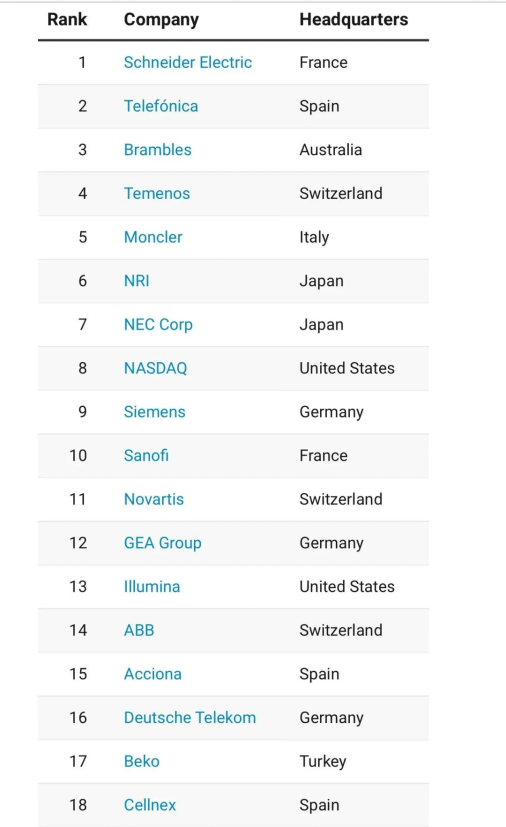NEWS CENTER
|
SchneiderIn the process of responding to climate change, companies are facing many complex issues: supply chain issues, tariffs and changes in government incentives for environmental projects. Analysts predict that the construction and operation of renewable energy, including wind and solar infrastructure, as well as battery development and the popularization of electric vehicles, may be hit by tariffs and the elimination of clean energy incentives. "Many companies face profit margin pressures, which may squeeze investments in sustainable materials or renewable energy," consulting firm Argon & Co wrote in May. "Moving production to new locations in search of tariff relief brings environmental and social risks, from higher carbon footprints to labor rights issues."
To track how the world’s top companies across a range of industries are responding to the challenge, TIME and data company Statista partnered to rank the world’s 500 most sustainable companies based on their public commitments and progress toward the SDGs in 2023, the most recent year for which complete data is available.
Many of the top companies provide primarily digital services, such as banking, consulting, communications and research; or, they provide renewable energy to others. The No. 1 company on this year’s list and last year’s is France’s Schneider Electric, which does both. Schneider Electric makes energy management software and advises other companies on reducing emissions, beating out rivals such as Siemens AG, GE Vernova and ABB to become the leading provider of technology for digitalizing energy grids. Schneider said in its first-quarter 2025 report that it exceeded its sustainability goals in 2024, helped RichLand Logistics launch new electric trucks for last-mile delivery and deployed Schneider Charge Pro electric charging stations in Europe. It also directly helped other top companies on the list reduce their carbon footprints. For example, through a program called Energize, it helps pharmaceutical companies including Sanofi (No. 10) and Novartis (No. 11) procure renewable energy for their operations.
Anke Hampel, Head of Sustainability at ABB, said: “Ranking in the top 15 of the 2025 list of the world’s most sustainable companies is a testament to ABB’s strategic approach to embed sustainability into its business, with a focus on transparency and accountability. Our sustainability agenda aims to achieve a low-carbon society, conserve resources and foster societal progress towards a net-zero future. As a global technology leader in electrification and automation, we help our customers optimize their energy use, reduce emissions and accelerate the transition to more resilient, resource-efficient operations.”
Olivier Blum, CEO of Schneider Electric, said: “As a technology company, our purpose is to be a trusted partner to our customers in achieving efficiency and sustainability. At Schneider, sustainability is at the heart of everything we do. We strive to be a company with an impact – one that is performance-based. Our purpose drives us to engage the entire ecosystem, our mission positions us as part of the solution and our culture sets us apart. This holistic approach ensures that every aspect of our operations and value chain contributes to a more sustainable world.”
|

